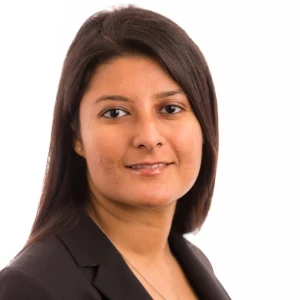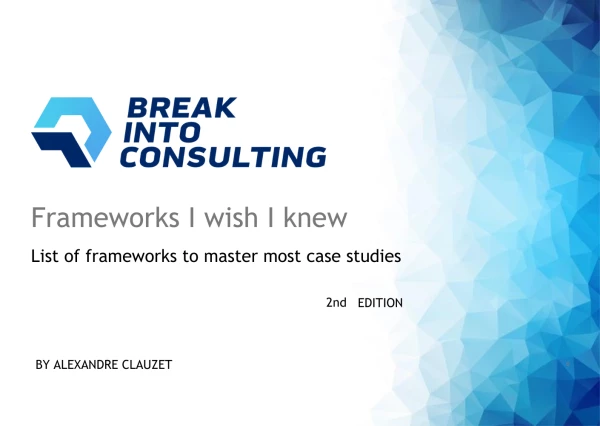I am still pretty new to case interviews. I did prepare a lot of theory already, and now I am especially struggling with the relationship of hypothesis and framework.
Specifically, I worked on a case to increase market share. Now this can be done in several ways. Do I first outline a general structure (lets say focused around the company, the consumer and the competition) and then start with one random hypothesis, for example target a new consumer segment, then test this with the general structure but only the relevant aspects? In case the hypothesis proves wrong, I then pick a new and use the same structure?
Or do I first state a hypothesis build a structure to that, and build a new structure in case this hypothesis is wrong?
I hope you understand my issue and can help me :)
How to state a hypothesis and match to the structure?


Hi,
There are two ways to use the hypothesis:
First - presenting a structure using the hypothesis. For example, if you are having a PE (private equity) case, you should do the following:
1) Make classic structure (market, company, competitors, feasibility of exit)
2) Make subpoints (e.g. in market: size, growth rates, profitability, segmentation, etc)
3) Present your 1st level Hypothesis:
- - "In order to understand whether we should invest in Company A, I would like to check that the Market is Attractive, the Company is Attractive, the competition is favorable and we have good opportunities for of exit"
4) Present the main 2nd level Hypothesis:
- "In the market, I would like to make sure that the market is big enough and growing;
- In the company I would like to find additional opportunities for growth;
- In competition I would like to check that the market is fragmented enough;
- Finally, I would like to check if we have potential buyers and can achieve desired exit multiples"
Another way to use hypothesis is using the hypothesis to prioritize your analysis:
1) Make a structure: "Problem in sales may be related to Sales Motivation, Sales Strategy, Sales Coverage, and Sales Process:
2) Prioritize a part of the structure based on your knowledge / common sense / available data: "Taking into account that motivation is the core problem of the sales organization, I would like to prioritize this part of the analysis"
Good luck!

Hi Carina,
my suggestion would be to first outline the structure (first and second level), and explore each point to test if your hypothesis is correct (thus first option mentioned by Vlad). In this way you can be sure that if the interviewer wants you to go in another direction, he/she can do so. If you base your structure on the various hypotheses, your overall plan will not sound as structured (by definition you will not have presented all the second levels) and the interviewer may not understand the whole process you have in mind.
Hope this helps,
Francesco
Hey Carina,
You should start by drafting a MECE (mutually exclusive, complementary exhaustive) structure/framework to approach the case (e.g., the one you reffered about evaluating different dimensions of the company) and then ask the interviewer whether he has any comments or preferences on where to start. If he doesn't, you should start where you feel that it is the most important point and start evaluating/analyzing that hypothesis... finish that analysis, and move to the next branch... and so on!
Best
Bruno

I can think of two instances when using a hypothesis makes sense:
1. Graphs - here an interviewer might explicitly ask you for your conclusions and hypothesis if you have any. Hypothesis in this instance would be something that is possibly true but would need to be proven and further analyzed before making a final conclusion.
2. After you've developed a framework. An interviewer might excplicitly ask you for your hypothesis. For example, you have a case about profitability problem of a regulated company (utilities etc.). I broke down the structure into revenue drivers and cost drivers. At the end, my interviewer asked me what is my hypothesis. A good hypothesis would have been: "The problem could be on the revenue or cost side, you told me that the utility is regulated, so we can't manipulate prices and increasing the volume of our customer base in limited to our region and is a long term solution (upgrading infrastructure, etc.), so I'd focus on optimizing costs and would return to revenue if we have time.

Hi,
The major mistake of the candidates is that they start using the hypothesis and neglect having a proper structure.
Moreover, if you perfectly solve the case without ever stating a hypothesis - you'll pass the interview. So most probably you had some other issues with the case as well and they used it as a standard feedback.
There are two ways to use the hypothesis:
First - presenting a structure using the hypothesis. For example, if you are having a PE (private equity) case, you should do the following:
1) Make classic structure (market, company, competitors, feasibility of exit)
2) Make subpoints (e.g. in market: size, growth rates, profitability, segmentation, etc)
3) Present your 1st level Hypothesis:
- - "In order to understand whether we should invest in Company A, I would like to check a number of the hypotheses - that the Market is Attractive, the Company is Attractive, the competition is favorable and we have good opportunities for of exit"
4) Present the main 2nd level Hypothesis:
- "In the market, I would like to make sure that the market is big enough and growing;
- In the company I would like to find additional opportunities for growth;
- In competition I would like to check that the market is fragmented enough;
- Finally, I would like to check if we have potential buyers and can achieve desired exit multiples"
Another way to use hypothesis is using the hypothesis to prioritize your analysis:
1) Make a structure: "Problem in sales may be related to Sales Motivation, Sales Strategy, Sales Coverage, and Sales Process:
2) Prioritize a part of the structure based on your knowledge / common sense / available data: "Taking into account that motivation is the core problem of the sales organization, I would like to prioritize this part of the analysis".
Good luck!














